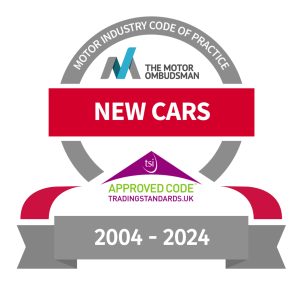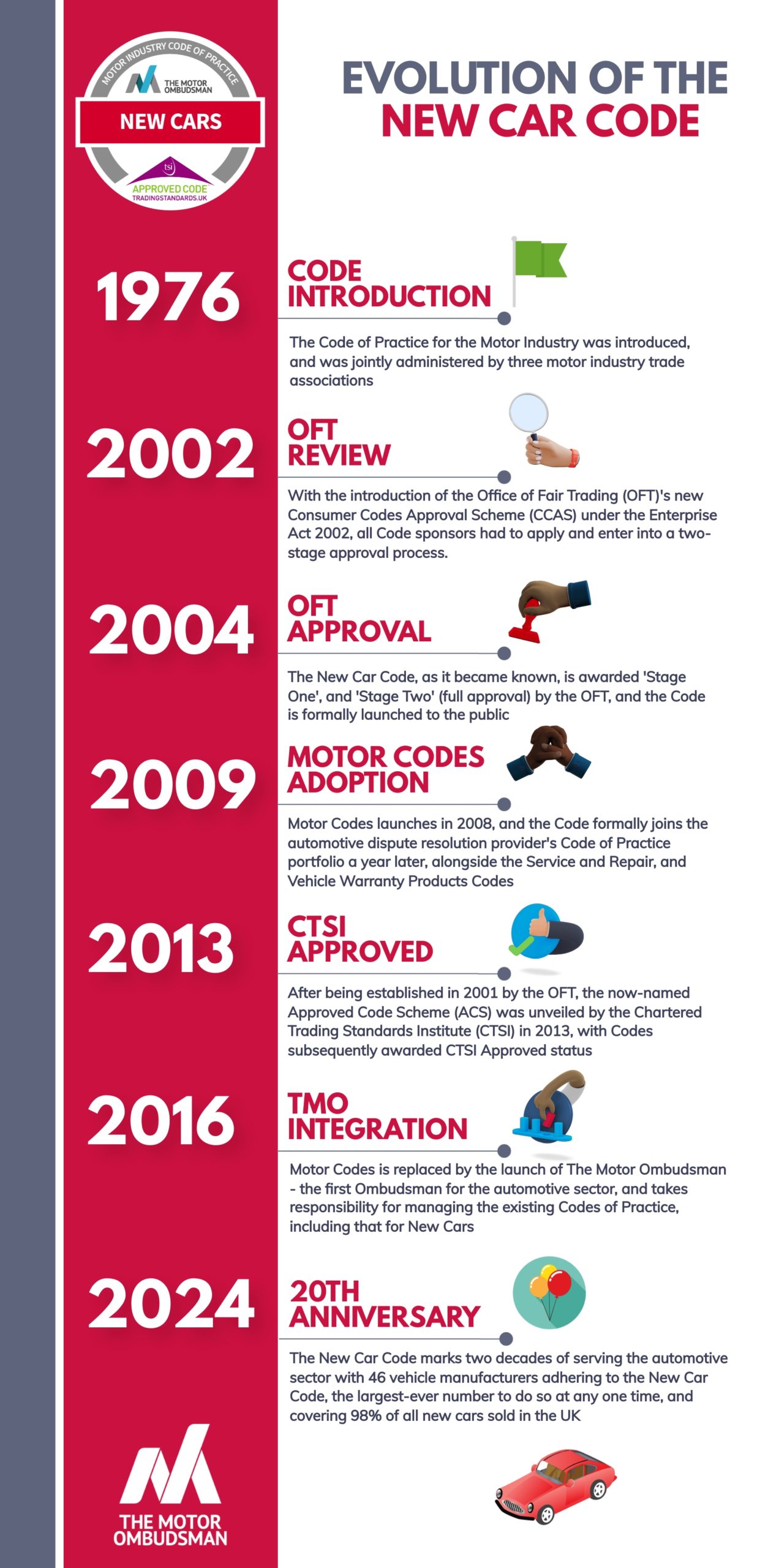The Motor Ombudsman marks the 20th anniversary of its New Car Code gaining full approval
- On this day, 20 years ago, it was announced that the Motor Industry Code of Practice for New Cars had gained ‘Stage Two’ and full approval from the former Office of Fair Trading (OFT), becoming the first Code of Practice in any industry to be awarded this prestigious status
- The New Car Code was introduced to drive up standards in the provision of new cars to customers by vehicle manufacturers, and the cover provided by their new car warranties
- A total of 46 carmakers are today committed to the Chartered Trading Standards Institute (CTSI)-approved Code, covering 98% of all new cars sold in the UK
- Accreditation grants a suite of benefits for vehicle manufacturers signed up to the Code, including all-important access to The Motor Ombudsman’s in-house, impartial and automotive-specific Alternative Dispute Resolution (ADR) service in the event of an unresolved consumer complaint
 The Motor Ombudsman, the Ombudsman dedicated to the automotive sector, is marking two decades since it was announced that the Motor Industry Code of Practice for New Cars received full ‘Stage Two’ approval from the former Office of Fair Trading (OFT). Superseding the Motor Industry Code of Practice, unveiled in 1976, the New Car Code was the first Code of Practice from any industry to achieve this prestigious status. Being given the green light in September 2004 meant that the Code was deemed to be effective in promoting and safeguarding the interests of motorists, and provided added protection to consumers when buying a new car.
The Motor Ombudsman, the Ombudsman dedicated to the automotive sector, is marking two decades since it was announced that the Motor Industry Code of Practice for New Cars received full ‘Stage Two’ approval from the former Office of Fair Trading (OFT). Superseding the Motor Industry Code of Practice, unveiled in 1976, the New Car Code was the first Code of Practice from any industry to achieve this prestigious status. Being given the green light in September 2004 meant that the Code was deemed to be effective in promoting and safeguarding the interests of motorists, and provided added protection to consumers when buying a new car.
Following its introduction two decades ago, the New Car Code has since provided a reputable and established framework of comprehensive guidelines, designed to drive up standards in the supply of new cars and warranties. It is today one of The Motor Ombudsman’s four Codes of Practice to be approved under the existing Approved Code Scheme operated by the Chartered Trading Standards Institute (CTSI), and is voluntarily adhered to by 46 vehicle manufacturers – the largest number to do so at any one time, and covering 98% of all new cars sold in the UK – a market worth around £70 billion in 2023.
The New Car Code outlines a total of 30 commitments for businesses, which include using easy-to-understand messaging in customer documentation and promotional material, presenting warranty terms in plain English and clearly listing any exclusions, and making spare parts available from the time a new model is launched. Businesses equally promise to take effective action in order to ensure that consumers receive a fair and swift response should a complaint arise.
Since The Motor Ombudsman was formed in 2016, the automotive authority has received around 11,800 contacts from consumers on average every year, and accepted nearly 1,200 cases annually that may be reviewed under the remit of the New Car Code. Disputes commonly reported by motorists relate to the provision of unclear manufacturer warranty terms, the management of complaints, delays to components being made available for repairs, and advertising potentially containing misleading information.
One of the many benefits of signing up The Motor Ombudsman Codes of Practice is that, should a dispute arise that a business is unable to resolve to a customer’s satisfaction via their in-house procedures, they are able refer a consumer to The Motor Ombudsman as an automotive-specific and independent third party, to investigate it in a fair and impartial environment, all at no cost to the customer.
In addition, vehicle manufacturers are able to use The Motor Ombudsman and Chartered Trading Standards Institute (CTSI) Approved Code logos on consumer-facing literature and online assets. Similarly, businesses have the opportunity to participate in dedicated industry round-tables, webinars and events that look at pertinent issues impacting the motor industry, and can take advantage of amplified brand exposure on the popular Motor Ombudsman website (TheMotorOmbudsman.org), and through The Motor Ombudsman’s own marketing initiatives, such as the annual Customer Service Star Awards.
Bill Fennell, Chief Ombudsman and Managing Director of The Motor Ombudsman, said: “Celebrating two decades of the New Car Code is a testament to our sustained commitment to driving even higher standards in our industry. The guidelines highlighted by the Code are as relevant today as they were 20 years ago, and remain pivotal in the delivery of exceptional service by vehicle manufacturers.”
Bill added: “We are immensely proud of the impact and legacy that the New Car Code has created to date, and it will continue to both evolve in line with the changing automotive sector, and act as a beacon of industry standards for existing businesses and new vehicle manufacturers that launch in the UK going forward.”
To view The Motor Ombudsman’s Motor Industry Codes of Practice, visit www.themotorombudsman.org/consumers/our-codes-of-practice
ENDS
Notes to editors
About the Motor Industry Code of Practice for New Cars
 The Motor Industry Code of Practice for New Cars (the New Car Code) ensures that vehicle manufacturers supply new cars and warranties to consumers responsibly. The Code helps to safeguard new car buyers from misleading advertising, and ensures that documentation supplied to consumers is easy to understand, that the terms of a warranty will be respected, and that any complaints will be handled swiftly.
The Motor Industry Code of Practice for New Cars (the New Car Code) ensures that vehicle manufacturers supply new cars and warranties to consumers responsibly. The Code helps to safeguard new car buyers from misleading advertising, and ensures that documentation supplied to consumers is easy to understand, that the terms of a warranty will be respected, and that any complaints will be handled swiftly.
The New Car Code covers the following principal areas:
- Advertising;
- New car provisions;
- Manufacturer new car warranties;
- The availability of replacement parts and accessories; and
- Complaints handling.
Infographic: The evolution of the New Car Code (1976 – 2024)




